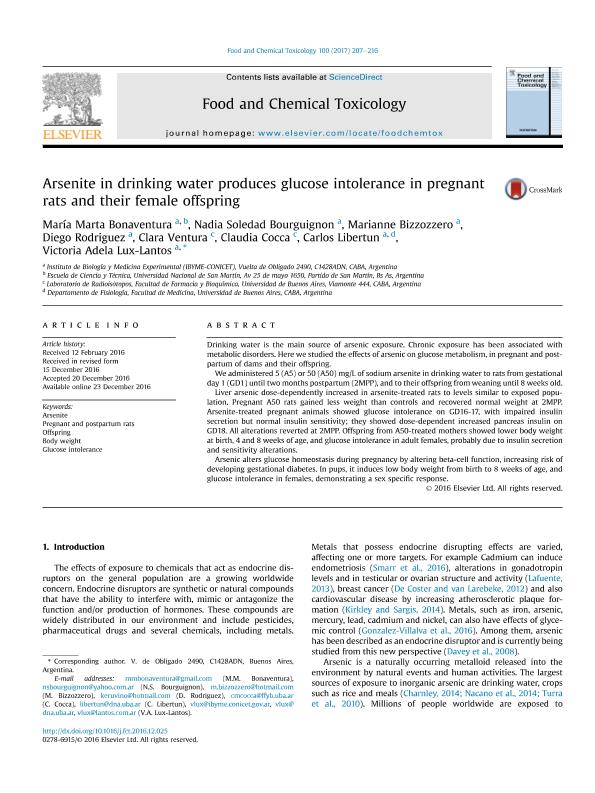Artículo
Arsenite in drinking water produces glucose intolerance in pregnant rats and their female offspring
Bonaventura, Maria Marta ; Bourguignon, Nadia
; Bourguignon, Nadia ; Bizzozzero Hiriart, Marianne; Rodriguez, Diego; Ventura, Clara
; Bizzozzero Hiriart, Marianne; Rodriguez, Diego; Ventura, Clara ; Cocca, Claudia Marcela
; Cocca, Claudia Marcela ; Libertun, Carlos
; Libertun, Carlos ; Lux, Victoria Adela R.
; Lux, Victoria Adela R.
 ; Bourguignon, Nadia
; Bourguignon, Nadia ; Bizzozzero Hiriart, Marianne; Rodriguez, Diego; Ventura, Clara
; Bizzozzero Hiriart, Marianne; Rodriguez, Diego; Ventura, Clara ; Cocca, Claudia Marcela
; Cocca, Claudia Marcela ; Libertun, Carlos
; Libertun, Carlos ; Lux, Victoria Adela R.
; Lux, Victoria Adela R.
Fecha de publicación:
02/2017
Editorial:
Pergamon-Elsevier Science Ltd
Revista:
Food And Chemical Toxicology
ISSN:
0278-6915
Idioma:
Inglés
Tipo de recurso:
Artículo publicado
Clasificación temática:
Resumen
Drinking water is the main source of arsenic exposure. Chronic exposure has been associated with metabolic disorders. Here we studied the effects of arsenic on glucose metabolism, in pregnant and post-partum of dams and their offspring. We administered 5 (A5) or 50 (A50) mg/L of sodium arsenite in drinking water to rats from gestational day 1 (GD1) until two months postpartum (2MPP), and to their offspring from weaning until 8 weeks old. Liver arsenic dose-dependently increased in arsenite-treated rats to levels similar to exposed population. Pregnant A50 rats gained less weight than controls and recovered normal weight at 2MPP. Arsenite-treated pregnant animals showed glucose intolerance on GD16-17, with impaired insulin secretion but normal insulin sensitivity; they showed dose-dependent increased pancreas insulin on GD18. All alterations reverted at 2MPP. Offspring from A50-treated mothers showed lower body weight at birth, 4 and 8 weeks of age, and glucose intolerance in adult females, probably due to insulin secretion and sensitivity alterations. Arsenic alters glucose homeostasis during pregnancy by altering beta-cell function, increasing risk of developing gestational diabetes. In pups, it induces low body weight from birth to 8 weeks of age, and glucose intolerance in females, demonstrating a sex specific response.
Archivos asociados
Licencia
Identificadores
Colecciones
Articulos(IBYME)
Articulos de INST.DE BIOLOGIA Y MEDICINA EXPERIMENTAL (I)
Articulos de INST.DE BIOLOGIA Y MEDICINA EXPERIMENTAL (I)
Articulos(IMBICE)
Articulos de INST.MULTIDISCIPL.DE BIOLOGIA CELULAR (I)
Articulos de INST.MULTIDISCIPL.DE BIOLOGIA CELULAR (I)
Citación
Bonaventura, Maria Marta; Bourguignon, Nadia; Bizzozzero Hiriart, Marianne; Rodriguez, Diego; Ventura, Clara; et al.; Arsenite in drinking water produces glucose intolerance in pregnant rats and their female offspring; Pergamon-Elsevier Science Ltd; Food And Chemical Toxicology; 100; 2-2017; 207-216
Compartir
Altmétricas



